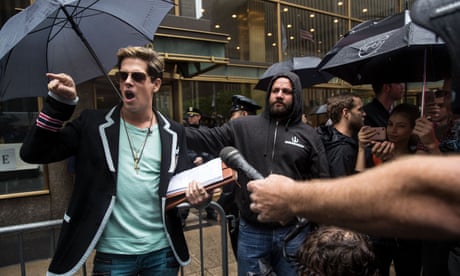Filippo Bernardini is accused of impersonating publishing figures to steal manuscripts, in scam that has stumped authors and editors for years

Author Margaret Atwood. Her book The Testaments was targeted by a fraudster, who contacted her publishers and even the Booker prize judges to get the manuscript ahead of publication.
Photograph: Ian West/PA
Sian Cain
THE GUARDIAN
Thu 6 Jan 2022
A mysterious fraudster who impersonated publishers and agents to steal book manuscripts in an international phishing scam may have finally been caught, with the FBI arresting a 29-year-old man at John F Kennedy airport in New York on Wednesday.
Filippo Bernardini, an Italian citizen who worked at UK publisher Simon & Schuster, was arrested upon landing in the US on Wednesday. The FBI alleged that Bernardini had “impersonated, defrauded, and attempted to defraud, hundreds of individuals” to obtain unpublished and draft works.
Bernardini is charged with wire fraud and aggravated identity theft in a New York district court, with the indictment saying Bernardini had registered more than 160 fake internet domains to impersonate others since 2016.
Bernardini’s arrest may mark the start of the end of a mystery that has fascinated and appalled the literary world for five years, during which hundreds of unpublished manuscripts have been targeted.
Some authors, agents, editors, scouts and even judges for the Booker prize have been victims of phishing scams involving manuscripts of highly anticipated novels by Margaret Atwood, Sally Rooney and actor Ethan Hawke.

‘If publishers become afraid, we’re in trouble’: publishing’s cancel culture debate boils over
Those responsible created slightly tweaked email addresses to fool publishing figures, including replacing “t” with “f”, “q” with “g”, and using “r” and “n” to make “m”, as in @penguinrandornhouse.com. They would use industry lingo, such as “ms” for manuscript, and demonstrated an understanding of the publishing process, which fooled some into handing over manuscripts and information about upcoming projects or film rights.
In a statement, a spokesperson for Simon & Schuster said the publisher was “shocked and horrified” by the allegations against Bernardini and that they had suspended him pending further information.
“The safekeeping of our authors’ intellectual property is of primary importance to Simon & Schuster, and for all in the publishing industry, and we are grateful to the FBI for investigating these incidents and bringing charges against the alleged perpetrator,” he added.
Simon & Schuster was not named in the indictment, and the Guardian understands it is not accused of wrongdoing.
Publishing industry figures and authorities have been stumped for years by possible motivations behind the phishing scam, with no ransom or blackmail demands ever materialising after manuscripts were mistakenly sent on.
None of the books ever turned up online, and everything from celebrity releases to debut novels by unknown writers were targeted. Some had suspected the individual was a literary scout, attempting to secure information to make film and television deals ahead of others.
“If you try to find financial and economic gain, it’s of course hard to see,” Daniel Sandström, literary director of a Swedish publisher that was targeted multiple times, told Vulture last year.
“But if the game is psychological, a kind of mastery or feeling of superiority, it’s easier to visualise. This is a business full of resentment as well, and in that sense, it becomes a good story.”
Sian Cain
THE GUARDIAN
Thu 6 Jan 2022
A mysterious fraudster who impersonated publishers and agents to steal book manuscripts in an international phishing scam may have finally been caught, with the FBI arresting a 29-year-old man at John F Kennedy airport in New York on Wednesday.
Filippo Bernardini, an Italian citizen who worked at UK publisher Simon & Schuster, was arrested upon landing in the US on Wednesday. The FBI alleged that Bernardini had “impersonated, defrauded, and attempted to defraud, hundreds of individuals” to obtain unpublished and draft works.
Bernardini is charged with wire fraud and aggravated identity theft in a New York district court, with the indictment saying Bernardini had registered more than 160 fake internet domains to impersonate others since 2016.
Bernardini’s arrest may mark the start of the end of a mystery that has fascinated and appalled the literary world for five years, during which hundreds of unpublished manuscripts have been targeted.
Some authors, agents, editors, scouts and even judges for the Booker prize have been victims of phishing scams involving manuscripts of highly anticipated novels by Margaret Atwood, Sally Rooney and actor Ethan Hawke.

‘If publishers become afraid, we’re in trouble’: publishing’s cancel culture debate boils over
Those responsible created slightly tweaked email addresses to fool publishing figures, including replacing “t” with “f”, “q” with “g”, and using “r” and “n” to make “m”, as in @penguinrandornhouse.com. They would use industry lingo, such as “ms” for manuscript, and demonstrated an understanding of the publishing process, which fooled some into handing over manuscripts and information about upcoming projects or film rights.
In a statement, a spokesperson for Simon & Schuster said the publisher was “shocked and horrified” by the allegations against Bernardini and that they had suspended him pending further information.
“The safekeeping of our authors’ intellectual property is of primary importance to Simon & Schuster, and for all in the publishing industry, and we are grateful to the FBI for investigating these incidents and bringing charges against the alleged perpetrator,” he added.
Simon & Schuster was not named in the indictment, and the Guardian understands it is not accused of wrongdoing.
Publishing industry figures and authorities have been stumped for years by possible motivations behind the phishing scam, with no ransom or blackmail demands ever materialising after manuscripts were mistakenly sent on.
None of the books ever turned up online, and everything from celebrity releases to debut novels by unknown writers were targeted. Some had suspected the individual was a literary scout, attempting to secure information to make film and television deals ahead of others.
“If you try to find financial and economic gain, it’s of course hard to see,” Daniel Sandström, literary director of a Swedish publisher that was targeted multiple times, told Vulture last year.
“But if the game is psychological, a kind of mastery or feeling of superiority, it’s easier to visualise. This is a business full of resentment as well, and in that sense, it becomes a good story.”
No comments:
Post a Comment